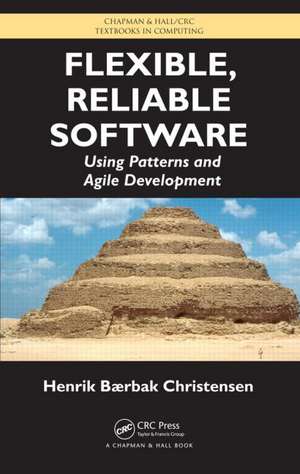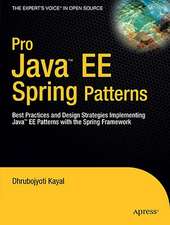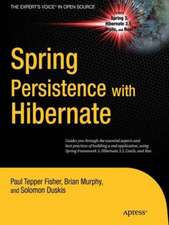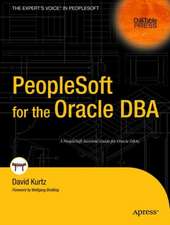Flexible, Reliable Software: Using Patterns and Agile Development: Chapman & Hall/CRC Textbooks in Computing
Autor Henrik B. Christensenen Limba Engleză Hardback – 4 mai 2010
The presentation is pedagogically organized as a realistic development story in which customer requests require introducing new techniques to combat ever-increasing software complexity. After an overview and introduction of basic terminology, the book presents the core practices, concepts, tools, and analytic skills for designing flexible and reliable software, including test-driven development, refactoring, design patterns, test doubles, and responsibility driven and compositional design. It then provides a collection of design patterns leading to a thorough discussion of frameworks, exemplified by a graphical user interface frramework (MiniDraw). The author also discusses the important topics of configuration management and systematic testing. In the last chapter, projects lead students to design and implement their own frameworks, resulting in a reliable and usable implementation of a large and complex software system complete with a graphical user interface.
This text teaches how to design, program, and maintain flexible and reliable software. Installation guides, source code for the examples, exercises, and projects can be found on the author’s website.
Din seria Chapman & Hall/CRC Textbooks in Computing
- 8%
 Preț: 476.14 lei
Preț: 476.14 lei - 20%
 Preț: 468.95 lei
Preț: 468.95 lei - 20%
 Preț: 745.40 lei
Preț: 745.40 lei - 9%
 Preț: 602.23 lei
Preț: 602.23 lei - 20%
 Preț: 566.10 lei
Preț: 566.10 lei - 20%
 Preț: 586.30 lei
Preț: 586.30 lei - 20%
 Preț: 390.05 lei
Preț: 390.05 lei - 20%
 Preț: 1004.02 lei
Preț: 1004.02 lei - 30%
 Preț: 489.15 lei
Preț: 489.15 lei - 20%
 Preț: 690.64 lei
Preț: 690.64 lei - 20%
 Preț: 320.57 lei
Preț: 320.57 lei - 20%
 Preț: 374.08 lei
Preț: 374.08 lei - 20%
 Preț: 619.66 lei
Preț: 619.66 lei - 28%
 Preț: 266.34 lei
Preț: 266.34 lei - 20%
 Preț: 590.46 lei
Preț: 590.46 lei - 20%
 Preț: 761.07 lei
Preț: 761.07 lei - 20%
 Preț: 657.55 lei
Preț: 657.55 lei - 31%
 Preț: 323.84 lei
Preț: 323.84 lei - 30%
 Preț: 353.30 lei
Preț: 353.30 lei
Preț: 643.08 lei
Preț vechi: 803.86 lei
-20% Nou
Puncte Express: 965
Preț estimativ în valută:
123.07€ • 128.01$ • 101.60£
123.07€ • 128.01$ • 101.60£
Carte tipărită la comandă
Livrare economică 12-26 aprilie
Preluare comenzi: 021 569.72.76
Specificații
ISBN-13: 9781420093629
ISBN-10: 1420093622
Pagini: 528
Ilustrații: PPI 606 Original printer Sheridan has endsheets; 4 Tables, black and white; 86 Illustrations, black and white
Dimensiuni: 178 x 254 x 35 mm
Greutate: 1.13 kg
Ediția:UK edition
Editura: CRC Press
Colecția Chapman and Hall/CRC
Seria Chapman & Hall/CRC Textbooks in Computing
ISBN-10: 1420093622
Pagini: 528
Ilustrații: PPI 606 Original printer Sheridan has endsheets; 4 Tables, black and white; 86 Illustrations, black and white
Dimensiuni: 178 x 254 x 35 mm
Greutate: 1.13 kg
Ediția:UK edition
Editura: CRC Press
Colecția Chapman and Hall/CRC
Seria Chapman & Hall/CRC Textbooks in Computing
Public țintă
UndergraduateCuprins
Basic Terminology. The Programming Process. The First Design Pattern. Variability Management and 3-1-2. Compositional Design. A Design Pattern Catalogue. Frameworks. Outlook. Projects. Bibliography. Indices.
Notă biografică
Henrik Bærbak Christensen is an associate professor in the Department of Computer Science at the University of Aarhus, where he has been teaching advanced design and programming techniques for more than ten years to young students and seasoned developers. Dr. Christensen is also the owner of Imhotep, a company specializing in consulting and courses in software development.
Recenzii
…This book brings together a careful selection of topics that are relevant, indeed crucial, for developing good quality software with a carefully designed pedagogy that leads the reader through an experience of active learning. The emphasis in the content is on practical goals—how to construct reliable and flexible software systems—covering many topics that every software engineer should have studied. The emphasis in the method is on providing a practical context, hands-on projects, and guidance on process. … The text discusses not only what the end product should be like, but also how to get there. … I know that this book will be a great help for many of my students on the path from a novice programmer to a mature, professional software developer.
—From the Foreword by Michael Kölling, originator of the BlueJ and Greenfoot environments, co-author of the best-selling Objects First with Java, and author of the best-selling Introduction to Programming with Greenfoot
—From the Foreword by Michael Kölling, originator of the BlueJ and Greenfoot environments, co-author of the best-selling Objects First with Java, and author of the best-selling Introduction to Programming with Greenfoot
Descriere
This text presents innovative agile methods and guides readers through the software development process. By describing practical stories, explaining the design and programming process in detail, and using projects as a learning context, the author helps readers understand why a given technique is required and why techniques must be combined to overcome the challenges facing software developers. He discusses the benefits and liabilities of each approach, provides a collection of design patterns, and includes projects that represent real-world tasks. The book also contains review questions, exercises, and selected solutions. Source code and other resources are available on the author’s website.













